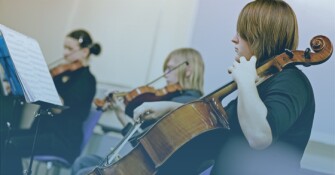
High schoolers who participate in music courses may score higher in academic subjects, according to a new study by Canadian researchers.
Examining over 110,000 educational records of students in British Columbia who started 1st grade between 2000 and 2003 and taking into account differences among the different groups of students, the study found that those who took a music class were more likely to score higher in math, science, and English.
“Music achievement predicts academic achievement and not the other way around,” said Peter Gouzouasis, a professor of music education at the University of British Columbia and one of the study’s authors. “So [it] is important to note that this is a one-way relationship.”
Additionally, students with higher levels of engagement in music—such as multiple years of experience—had higher scores. The study calculated that students who are highly engaged in music are on average over one year ahead of their peers who are not engaged in music.
Results were more pronounced for students who participated in instrumental music rather than vocal music. Gouzouasis also noted that while this study did not examine the impact of visual arts on academic achievement, other research has shown a negative correlation between the two.
According to the study, these results may be credited to the way instrumental music impacts cognition, executive functioning of the brain, motivation-related characteristics, and social-personal development.
“These are all part of what psychologists refer to as transfer,” Gouzouasis said, referencing one’s ability to apply information learned in one situation to another.
In examining achievement, the study controlled for students’ previous achievement, sex, cultural background, and neighborhood socioeconomic status. Students who began school after 2003, completed less than three years of high school, or had no data from exams taken in grade 10 English, science, math or grade 12 English were omitted.
Educational records show that approximately 14 percent of students in British Columbia participated in at least one music course in grades 10, 11, or 12. Although some may take private lessons, but not participate in music at school, Gouzouasis said students do not always learn the same skills required in school-based music classes, such as reading music, or there were not enough students to make an impact on the results.
“To the extent that even if there were kids who were doing exactly what the school music kids [did] ... they still didn’t have an impact on the strong findings that we have,” Gouzouasis said.
According to Gouzouasis, similar results should be expected from students in the United States, especially since the study controlled for variables, such as ethnicity and socioeconomic status.
Previous studies suggest that music participation in the United States may be higher than that in the Canadian study. Of the class of 2004, 36 percent graduated high school having earned at least one course credit in music, according to a 2013 University of Maryland study.
The new findings differ from some previous research on the link between arts education, including music, and academic achievement, which has been mixed. The study attributes this controversy in part to “the inherently complex nature of the phenomenon of music, in that there are many varied ways of music-making, music engagement, and music education.”
The new study also encourages additional research on the topic.
But Gouzouasis also says schools can act on his findings now by seeking funding from outside organizations to support and implement sustainable music education. He also urges schools to provide instruments to students in order to ensure that instrumental learning is accessible.
“If you want better programmers and mathematicians, then this is what you need to do,” Gouzouasis said.
Photo courtesy of Getty.